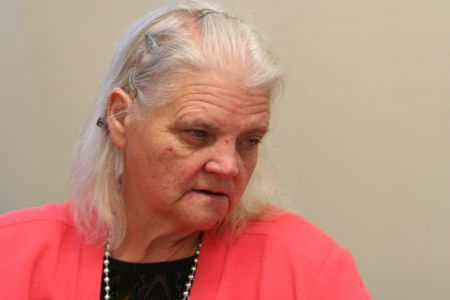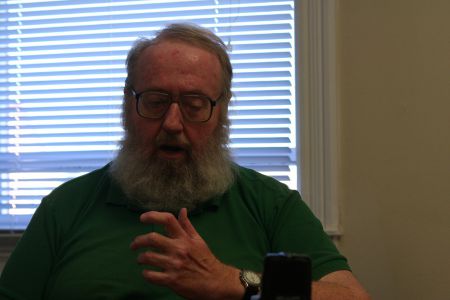KJIPUKTUK (Halifax) – People living in poverty are being ignored by politicians of every stripe.
That's what poverty activists told the few members of the media who could be bothered at a press conference held this morning in the Halifax North End.
The press conference was called by the Community Advocates Network, a group of people living in poverty and their allies.
“All the parties are cozying up to the middle class and ignoring people living in poverty,” said Ann Duffy, a long-time poverty activist who lives at the Mulgrave Park public housing complex. “We are real people, and we must teach them not to ignore us.”
The way to teach politicians that lesson is through voting on October 19th, the group says.
Voting is not the only way or even the best way to foster change, but it sure sends a powerful message. One in nine people in Halifax lives in poverty, and that's a lot of people, the group argued.
Typically poverty is considered a provincial issue, with welfare rates and rules set by the provincial government. But the federal government plays an important role.
“The feds do have jurisdiction to send larger transfer payments specifically tied to increased welfare allowances,” explained poverty activist (and frequent Halifax Media Co-op contributor) Kendall Worth.
Michael Bradfield, a retired Dalhousie economics professor, agreed.
“The federal government should transfer a lot more money to the provinces and the municipalities, so that they can invest in people, in education, in healthcare, and in income support. There should be a massive increase in federal transfers,” said Bradfield. “We can afford it. The country is about twice as rich now as when we started social programs.”
Bradfield called on politicians to make the entire tax system more progressive, including taking a hard look at flat tax systems such as property taxes and sales taxes, which mostly benefit the wealthy.
“The lowest 20 percent in Canada pay a higher part of their income on taxes then the wealthiest one percent,” said Bradfield. “That's how distorted our system is.”
There are a million reasons why people living in poverty frequently don't vote.
“People get discouraged. Not one of the three leading parties has said a lot about poverty. All they ever did was dance around it a bit,” said Wayne MacNaughton, who receives a disability allowance through Community Services.
“Politicians only want to talk about programs, but people are poor because they don't have enough money,” said MacNaughton. “We need a guaranteed livable income, in the long run it will be less costly.”
As well, the government has made it more difficult for poor people to vote.
This election almost 25 percent of the most vulnerable people will not vote because they do not have and cannot afford the proper ID, said Duffy, alluding to last Fall's Fair Election Act, with its more onerous identification requirements.
Documentary maker, actor and writer Jackie Torrens said that poverty should be a consideration at the ballot box for everybody, not just the people directly affected.
Torrens recently released the much-praised documentary My Week on Welfare, offering glimpses into the lives of Nova Scotians struggling to make ends meet under a punitive and mean-spirited provincial welfare regime.
“Even lots of well-meaning progressive people indulge in stereotypes,” said Torrens. “That derails the conversation we should be having. We need to put our money where our mouth is and let our elected officials know that we care.”
After the press conference many in the audience took to the microphone to talk about their struggles to maintain a sense of dignity when everybody and everything seems to want to push you down and render you invisible.
“We aren't a delusion, we are part of the Canadian people,” said Patty. We are not just an apparition, but we are the people who are being forsaken.”
Click here for more Halifax Media Co-op coverage of Community Services and social assistance issues.
Join the annual Halifax March to End Poverty, Saturday October 17
Follow Robert DeVet on Twitter




